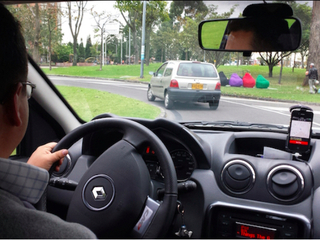M&A activity in the warehouse robotic space
Robots are taking over the heavy lifting work inside warehouses
Read more...Editor's Note: Our annual Vator Splash Spring 2016 conference is around the corner on May 12, 2016 at the historic Scottish Rite Center in Oakland. Speakers include Nigel Eccles (CEO & Co-founder, FanDuel), Andy Dunn (Founder & CEO, Bonobos), Mitch Kapor (Founder, Kapor Center for Social Impact); Founders of NextDoor, Handy, TubeMogul; Investors from Khosla Ventures, Javelin Venture Partners, Kapor Capital, Greylock, DFJ, IDG, IVP and more. Join us! REGISTER HERE.
 The long debate is over—in two states anyway.
The long debate is over—in two states anyway.
Uber announced this week that it has agreed to a settlement in two class-action lawsuits brought against it (“O’Connor” in California and “Yucesoy” in Massachusetts), effectively asserting what the company has wanted all along: Uber drivers are independent contractors.
Arriving at that classification wasn’t exactly cheap, as Uber will pay out $84 million to the approximately 385,000 drivers represented in the suit, and then another $16 million if the company goes public and hits a certain valuation.
In addition to the financial amends, Uber has also agreed to laundry list of concessions, including new specific policies designed to give drivers greater transparency about what keeps them in good standing and what could boot them off the platform. Already, the company has published this driver deactivation policy in English, Spanish, Mandarin, and Arabic.
Uber will also give drivers more information about their individual rating and how it compares with other drivers. Furthermore, the company has been tasked with creating a "driver's association" in both California and Massachusetts, and will meet with these associations quarterly. It’s worth noting that these associations won’t have the advantages and disadvantages that come with unions, which have been approved for Uber and Lyft drivers in Seattle.
The settlement is subject to approval by Judge Edward M. Chen, who was presiding over the case. If the case is approved, it could set precedent for other states’ policies, though it’s in no way binding.
"No court has decided here whether Uber drivers are employees or independent contractors and that debate will not end here," said Shannon Liss-Riordan, the attorney representing drivers in the case. "This case, however, with this significant payment of money, and attention that has been drawn to this issue, stands as a stern warning to companies who play fast and loose with classifying their workforce as independent contractors, who do not receive the benefits of the wage laws and other employee protections."
In January, Uber’s primary U.S. competitor Lyft agreed to a similar settlement with its drivers for a much more affordable $12 million, but U.S. District Judge Vince Chhabria threw out the settlement because he believed the drivers had been shortchanged.
These cases are just the beginning of what could be a much-larger conversation growing not just in the U.S. but around the world, as on-demand companies continue to shape and deeply transform the ways people are used to working.
“Uber is a new way of working: it’s about people having the freedom to start and stop work when they want, at the push of a button,” wrote Uber CEO Travis Kalanick in a blog post. “As we’ve grown we’ve gotten a lot right—but certainly not everything. This new deactivation policy is an important step forward when it comes to working with drivers.”
It’s definitely promising to see Uber taking a more humble and transparent approach, and one that makes for a better relationship with its drivers. But as Liss-Riordan says, the classification debate between employees and independent contractors has not yet ended, so we’ll be sure to follow future developments as they come.
Robots are taking over the heavy lifting work inside warehouses
Read more...The company also expanded access to 12 different provider types for male fertility care
Read more...Ezra's AI cancer screening platform will be available in 150 RAYUS locations
Read more...Startup/Business
Joined Vator on
Uber is a ridesharing service headquartered in San Francisco, United States, which operates in multiple international cities. The company uses a smartphone application to arrange rides between riders and drivers.
Startup/Business
Joined Vator on
Lyft is a peer-to-peer transportation platform that connects passengers who need rides with drivers willing to provide rides using their own personal vehicles.




